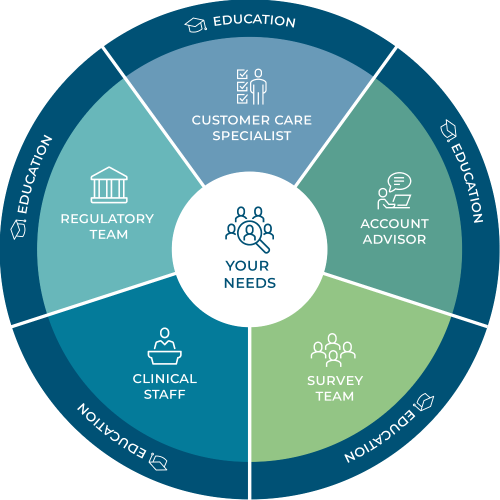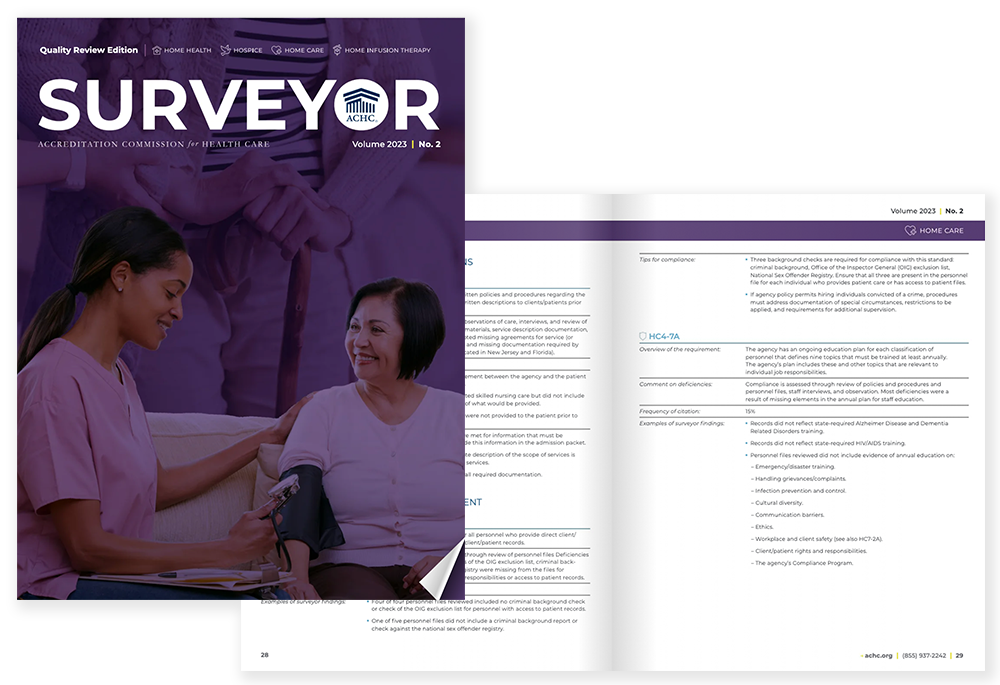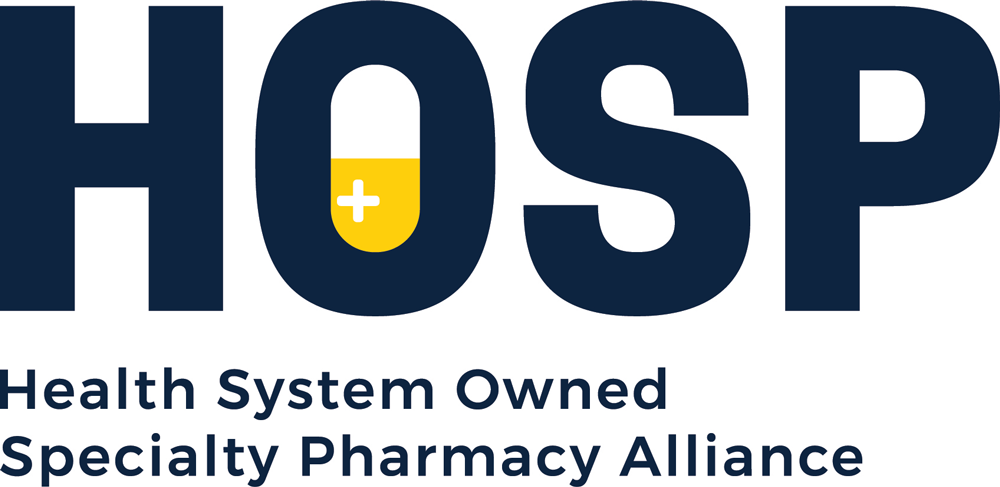The preferred choice
Pharmacy Accreditation
Expertise matched to the focus of your business.
I AM:
Welcome
From community retail operations to specialty pharmacy services for rare diseases and orphan drugs to hub-and-spoke locations for infusion services, the role of the pharmacy is expanding—and critical to patient outcomes.
ACHC pharmacy standards are structured so that you can focus on requirements relevant to the specific focus of your pharmacy. Our accreditation is recognized as a symbol of quality and value, and widely accepted by payors, a meaningful aspect of your sustainability!
For compounding pharmacies, ACHC accredits under the PCAB brand. PCAB Accreditation aligns with USP requirements for nonsterile, sterile, and hazardous compounding. And ACHC’s commitment to education supports your ability to maintain continuous compliance through resources developed by our experienced, expert pharmacy staff. They’ve been in your shoes, understand the pain points, and are dedicated to supporting your success.

The ACHC approach: Surrounding you with education
ACHC surrounds you with accessible, responsive resources to fit your needs.

ACHC Clinical Staff provides resources for standards interpretation and problem solving.
Our Regulatory Team conducts research and shares knowledge about federal and state requirements.
The ACHC process: Steps to achieving accreditation
Expect total support.
-
Get Started
-
Presurvey
-
Survey
-
Post-Survey
-
Decision
-
All

Connect with our Team
We can help you get started.

Information Form
Register to access the ACHC customer portal.

Application
Complete your accreditation application and submit deposit.

Verification / Scheduling
Your Account Advisor verifies application completion and advances to Scheduling.

Opening Conference
Surveyor introductions and finalized survey agenda.

Onsite Survey
Surveyor observations, interviews, and document review with ongoing Q&A.

Closing Conference
Surveyor general observations and findings.

Final Survey Report
Provided within 10 business days of the last day of survey.

Plan of Correction
Submit Plans of Correction (PoC) within 30 days of the final survey report.

ACHC Reviews PoC
- PoC accepted or revised (as needed)
- Final version submitted to the ACHC Review Committee for consideration.

Accreditation Decision
Letter sent within five business days of Review Committee decision.

Connect with our Team
We can help you get started

Information Form
Register to access to ACHC customer portal.

Application
Complete ACHC accreditation application and submit deposit.

Verification / Scheduling
Your Account Advisor confirms that your application is complete and advances it to Scheduling.

Opening Conference
Surveyor introductions finalized survey agenda.

On-site Survey
Register to access to ACHC customer portal.

Closing Conference
General observations and an overview of preliminary findings.

Final Survey Report
Provided within 10 business days of the last day of survey.

Plan of Correction
You submit Plans of Correction (PoC) within 10 days of the final survey report.

ACHC Processes Plan of Correction.
- ACHC reviews PoC
- Makes revisions (as needed).
- Final PoC submitted to the ACHC Review Committee for an accreditation decision.

Accreditation Decision
Decision letter sent within five business days of Review Committee decision.
Pharmacy Accreditation services and distinctions
Services
ACHC Standards—the requirements you must meet to achieve ACHC Pharmacy Accreditation—are designed to be relevant to your pharmacy’s business model. ACHC will work in partnership with you to build a customized accreditation solution based on your needs. View available services and distinctions below.
Ambulatory Infusion Centers are centralized locations where a patient can receive infusion therapy that is administered by the appropriate clinical personnel.
Community Retail services are provided in retail stores that sell prescription medications and commonly used durable medical equipment and supplies to the consumer.
Infusion Nursing services involve the administration of parenteral medications via various accesses and ports provided by a qualified Registered Nurse (RN), Licensed Practical Nurse (LPN), or skilled professional, as allowed by state regulations, specifically trained in these specialized services. These services can be provided in a variety of settings. A Registered Nurse or Pharmacist is responsible for supervision of all IRN services.
NOTE: IRN can be recognized for reimbursement by third-party payors and licensing boards. As of 2021, providers seeking to meet the Conditions for Coverage (CfCs) to receive Medicare reimbursement must be accredited under ACHC’s Home Infusion Therapy Accreditation program.
Infusion Pharmacy services include IV drug mixture preparation, therapy monitoring, client/patient counseling, and education. ACHC Infusion Pharmacy Standards include sterile compounding, referencing USP <797>. IRX covers the process of sterile compounding, patient care, and pharmacy-related DMEPOS equipment and supplies.
Revised ACHC IRX Standards that include USP updates to Chapter <797> took effect June 1, 2024. Organizations must now meet new USP requirements. Accreditation options offered before that date have ended.
Infusion pharmacies that handle hazardous drugs must add Hazardous Drug Handling (HD) Accreditation as a service. HD Accreditation Standards incorporate safety requirements of USP Chapter <800>. (Options offered before June 1, 2024, have ended.) The ACHC Distinction in Hazardous Drug Handling (HDH) has been retired and is no longer available.
Hazardous Drug Handling Accreditation (Ref. USP <800>)
Hazardous Drug Handling (HD) Accreditation Standards incorporate patient, employee, and environmental protection requirements established by USP General Chapter <800>, which became enforceable November 1, 2023. It is not a stand-alone service and is available for pharmacies seeking or renewing ACHC Infusion Pharmacy (IRX) Accreditation.
Infusion Pharmacy without Sterile Compounding enables infusion and specialty pharmacies to achieve accreditation without a clean room. Accreditation is available for infusion pharmacies facing delays in completing and certifying a clean room and for infusion and specialty pharmacies that supply, but don’t prepare, sterile infused medications.
IRX-NO797 includes IV administration, therapy monitoring, client/patient counseling, and education. It is the administration of medications using intravenous, subcutaneous, and epidural routes. IRX-NO797 focuses on the process of patient care and pharmacy-related DMEPOS equipment and supplies.
For more information, visit achc.org/irx-no797/.
Long-Term Care Pharmacy services include managing medications for residents of institutional facilities to ensure proper drug therapy, as well as packaging and delivery of medications.
Mail Order Pharmacies focus on the preparation and dispensing of prescription medications delivered by qualified distribution methods directly to consumers. Pharmacies that undergo this accreditation demonstrate compliance with standards addressing: Pharmacy licensure, shipping methodology, patient and employee safety, prescription intake and review, patient records and communication, personnel training, organizational oversight, and ongoing quality improvement.
Specialty Pharmacies dispense medications (injectable, intravenous, or oral) to a client’s/patient’s home, physician’s office, or clinic specializing in certain disease states. Specialty medications target a specific population with a chronic and sometimes life-threatening disease. Specialty Pharmacy services include disease-specific clinical monitoring, as well as patient compliance and adherence programs.
Specialty Pharmacy without DMEPOS services are for specialty pharmacies that DO NOT supply and/or bill Medicare patients for DMEPOS products as described by Medicare Part B coverage guidelines. This accreditation survey date can be coordinated and announced. ACHC will not report DMEPOS-accredited product codes to the National Supplier Clearinghouse (NSC).
Non-Sterile Pharmacy Compounding is a process by which ingredients are combined, mixed, or altered to create pharmaceutical preparations. These preparations are designed to be administered by a route that does not require sterility as result of a practitioner’s prescription. Compounding includes the preparation of drugs in anticipation of receiving prescriptions based on routine, regularly observed prescribing patterns. PCAB Non-Sterile Pharmacy Compounding Accreditation references USP <795> and measures a specific set of process standards that concentrate on the quality and consistency of compounded preparations.
Revised PCAB CFNS Standards that include USP updates to Chapter <795> took effect June 1, 2024. Organizations must now meet new USP requirements. Accreditation options offered before that date have ended.
Compounding pharmacies that handle hazardous drugs must add Hazardous Drug Handling PCAB (HDPCAB) Accreditation as a service. HDPCAB Accreditation Standards incorporate safety requirements of USP Chapter <800>. (Options offered before June 1, 2024, have ended.) The PCAB Distinction in Hazardous Drug Handling (HDH) has been retired and is no longer available.
Hazardous Drug Handling PCAB Accreditation (Ref. USP <800>)
HDPCAB Accreditation Standards incorporate patient, employee, and environmental protection requirements established by USP General Chapter <800>, which became enforceable November 1, 2023. It is not a stand-alone service and is available for compounding pharmacies seeking or renewing PCAB Accreditation for Non-Sterile (CFNS) Pharmacy Compounding.
Sterile Pharmacy Compounding is the practice of creating sterile preparations for patients through strict procedures to prevent contamination and maintain patient safety. PCAB Sterile Pharmacy Compounding Accreditation references USP <797> and measures a specific set of process standards that concentrate on the quality and consistency of medications that are produced.
Revised PCAB CFST Standards that include USP updates to Chapter <797> took effect June 1, 2024. Organizations must now meet new USP requirements. Accreditation options offered before that date have ended.
Compounding pharmacies that handle hazardous drugs must add Hazardous Drug Handling PCAB (HDPCAB) Accreditation as a service. HDPCAB Accreditation Standards incorporate safety requirements of USP Chapter <800>. (Options offered before June 1, 2024, have ended.) The PCAB Distinction in Hazardous Drug Handling (HDH) has been retired and is no longer available.
Hazardous Drug Handling PCAB Accreditation (Ref. USP <800>)
HDPCAB Accreditation Standards incorporate patient, employee, and environmental protection requirements established by USP General Chapter <800>, which became enforceable November 1, 2023. It is not a stand-alone service and is available for compounding pharmacies seeking or renewing PCAB Accreditation for Sterile (CFST) Pharmacy Compounding.
Distinctions
Distinctions offer additional recognition for specialties that go above and beyond expectations for most pharmacies. The options must be earned in conjunction with (or after being awarded) Pharmacy Accreditation by ACHC.
This additional recognition encompasses delivery of medications for the treatment of HIV; the ability to clearly manage client/patient adherence to these medications; collaboration between the physician, pharmacist, and client/patient to optimize the client’s/patient’s plan of care; cost containment; and outcomes. This distinction in HIV will show a clear, delineated dispensing and purchasing methodology.
This additional recognition was developed as a way for infusion providers to demonstrate their expertise in the delivery of parenteral and enteral nutrition products, with a focus on nutrition-specific pharmacy operations and provision of care. This distinction must be achieved in combination with ACHC Infusion Pharmacy Accreditation.
This additional accreditation recognition encompasses: delivery of medications for the treatment of cancer-specific conditions; the ability to identify the toxic nature of these medications; and collaboration between the physician, pharmacist, and client/patient to optimize the client’s/patient’s plan of care, cost containment, and client/patient outcomes.*
The additional recognition in Rare Diseases and Orphan Drugs encompasses processes and procedures necessary to bring medications for rare diseases into market from FDA approval to patient management, employee education, and medication handling and dispensing. There must be a clear, and agreed upon, collaboration between the pharmacy and the manufacturer to provide optimal patient care with the ability to collect, analyze, report on, and act upon data collected during the patient treatment journey.
Ready to get started?

Organizations seeking Specialty Pharmacy and/or Infusion Pharmacy Accreditation automatically gain access to essential workshops and workbooks from ACHCU, our education division.
These popular resources have helped hundreds of organizations understand and embrace the ACHC accreditation process. Now they’re available as part of your accreditation agreement.
- Use the ACHC Accreditation Guide to Success digital workbook to create more efficient policies and procedures.
- Assess your survey readiness with the included audit tools.
- Use the workshop to equip your team with the know-how to achieve excellence.
Get more insight into ACHC resources and standards by subscribing to our Did You Know? newsletter.
If you have questions, don’t forget to visit our FAQs.
Preview the deep dive offered by the infusion pharmacy workshop.
Recent Pharmacy Articles
ACHC Resources
To get you to the most frequently needed information, choose a link below.
Regulatory Updates
Publications
Education
Vendor Partners
It’s who you know
Associations that partner with ACHC and advocate for excellence in pharmacy practice










